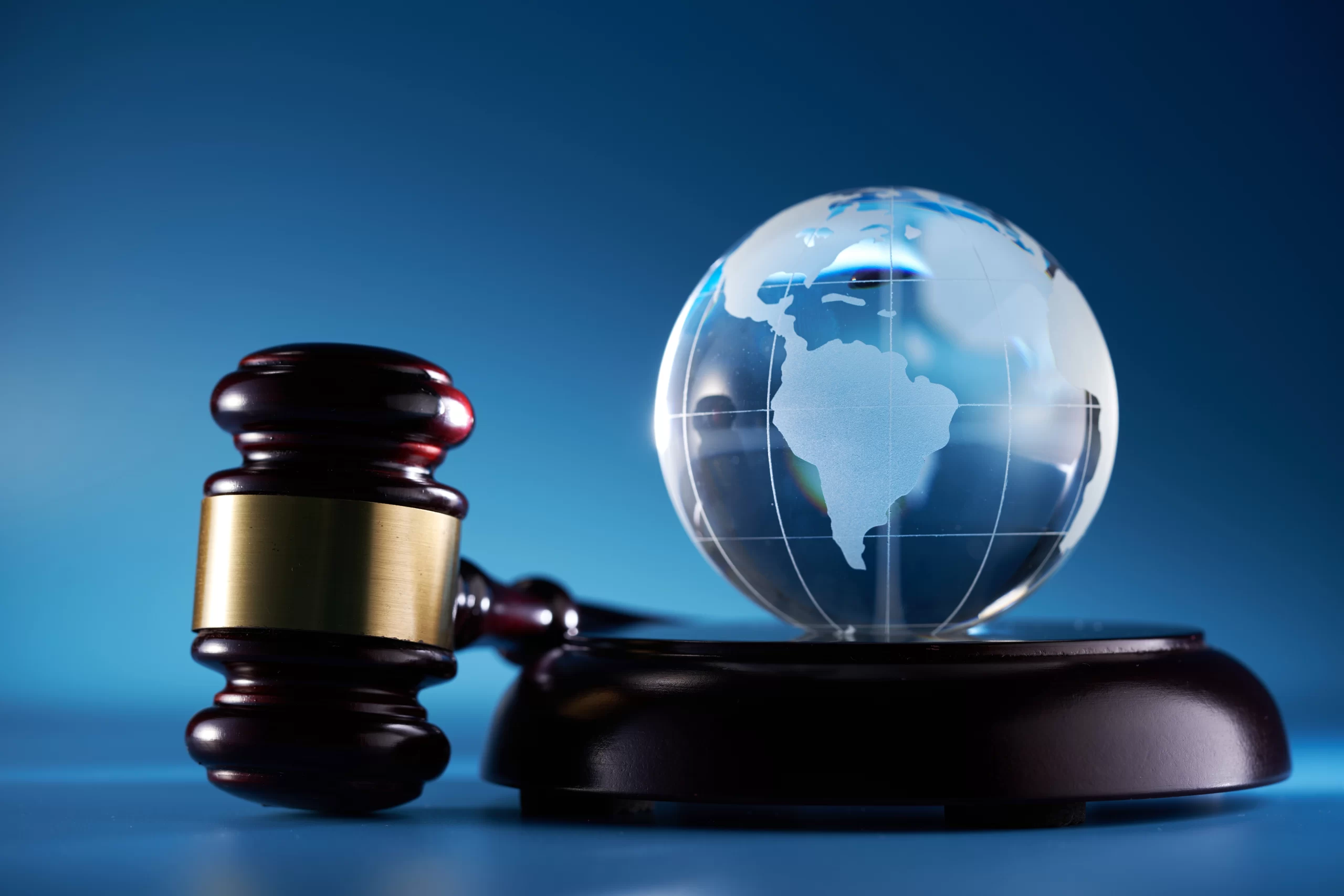O International Court of Justice (ICJ), also known as the International Court of Justice, is the principal judicial organ of the United Nations (UN). It was established with the aim of promoting international peace and justice by providing a forum for the peaceful resolution of disputes between sovereign states. Its creation was based on the Charter of the United Nations, adopted in 1945, becoming the central legal framework for international relations.
The ICJ has its headquarters in The Hague, the Netherlands, and its composition consists of 15 judges, who are elected by the General Assembly and the UN Security Council for a nine-year term. The court seeks to ensure that its membership reflects equitable geographic representation and a diversity of legal systems around the world. Each judge is selected on the basis of his or her competence, independence and integrity, and is expected to act impartially in interpreting and applying international law.
The primary function of the International Court of Justice is to resolve legal disputes between States. These disputes may involve territorial issues, treaties, human rights, among other issues. When States agree to submit their disputes to the ICJ, they accept its jurisdiction and undertake to abide by its decisions. While its decisions are binding only on the parties involved, they carry significant weight and have the potential to influence international legal practice and the settlement of future disputes.
In addition to resolving disputes between States, the ICJ also issues advisory opinions at the request of authorized UN bodies and agencies, allowing the court to provide guidance on specific legal issues. These advisory opinions play an important role in providing clarification and interpretation of international law in areas as diverse as human rights, environment and humanitarian issues.
The International Court of Justice also plays a crucial role in the evolution of international law. Its decisions and advisory opinions contribute to the development and codification of international law, helping to set precedents that shape global legal practice.
However, despite its importance, the TIJ faces significant challenges. One of them is the question of the execution of its decisions, since it does not have a coercive apparatus to enforce its orders. Furthermore, the accession of some States to the jurisdiction of the court is optional, which may limit its effectiveness in some cases.
At a historic meeting of the United Nations General Assembly, Secretary-General António Guterres made an emphatic call for “more incisive action” in pursuit of climate justice. The highlight of the meeting was the adoption, by consensus, of a resolution that underscores the responsibility of countries in tackling climate change.
The approved resolution emphasizes the importance of concrete and effective measures to combat the devastating impacts of climate change. The decision is based on an advisory opinion issued by the International Court of Justice.
The ICJ advisory opinion was a significant milestone on the climate justice scene. Inspired by the view that nations have a responsibility to act to protect the global climate system, this opinion offers legal guidance that can have profound implications for countries that fail to meet their obligations regarding climate action.
By linking the resolution to the possibility of legal consequences for nations that damage the climate system, the UN General Assembly seeks to send a strong signal that inertia and negligence in tackling climate change will no longer be tolerated. The expectation is that this legal approach can generate greater awareness and pressure on States to adopt concrete and urgent measures to face the climate crisis.
António Guterres' statement during the meeting highlights the relevance of the ICJ's advisory opinion as a catalyst for stronger action at the global level. Based on the Court's legal interpretations, countries are urged to take responsibility for their greenhouse gas emissions, as well as for other actions that may contribute to worsening climate change.
In addition, the Secretary General stresses that the General Assembly's decision reinforces the need for international cooperation to face the climate crisis. Climate change is a global challenge that affects everyone, regardless of their national borders. For this reason, an effective response requires collaborative efforts among countries to promote a just and sustainable transition towards a low-carbon future.
Including the legal perspective in the climate debate can also have a profound impact on how climate policies and measures are designed and implemented. Countries may be compelled to consider the legal implications of their climate actions, as well as responsibility for any damage caused to other states and the environment.
In this way, the meeting at the UN General Assembly, with the Secretary-General's emphatic speech and the approval of the resolution by consensus, represents an important step towards greater accountability of countries in relation to climate action. The advisory opinion of the International Court of Justice plays a fundamental role in this process, by providing a legal basis for nations to take more assertive measures in the fight against climate change. With this approach, the international community seeks to promote a sustainable and safe transition.
Essential Differences Between the UN International Court of Justice and the International Criminal Court
The Peace Palace in The Hague, Netherlands, is home to two important international institutions: the International Court of Justice (ICJ – ICJ) and the International Criminal Court (ICC), also known as the Hague Court. Despite the physical proximity, it is common for confusion to occur between these two bodies, but the fundamental difference between them lies in their competences and judicial approaches.
The International Court of Justice (ICJ), established in 1945 on the basis of the Charter of the United Nations, is the principal judicial organ of the UN. Comprised of 15 judges elected by the UN General Assembly and Security Council, the ICJ's primary function is to resolve legal disputes between sovereign states. Its decisions, usually handed down in territorial disputes, human rights issues, international treaties and other matters, are binding on the parties involved. This means that States that submit their disputes to the ICJ agree to abide by its decisions. Judgments are final and not subject to appeal, however, should a dispute arise over the meaning or scope of a judgment, one of the parties may request an interpretation from the Court. Furthermore, if there is a discovery of a fact hitherto unknown to the Court that may be a deciding factor, either party may request a review of the judgment.
On the other hand, the International Criminal Court (ICC), inaugurated in 2002, is a permanent court that judges individuals, not states. Its jurisdiction is restricted to serious crimes of international scope, such as genocide, crimes against humanity, war crimes and the crime of aggression. The ICC is complementary to national justice systems and only acts when States are unable or unwilling to prosecute those responsible for such crimes. Unlike the ICJ, which decides disputes between nations, the ICC handles criminal proceedings against individuals accused of committing the most serious crimes that shock the conscience of mankind.
The differences between these two instances are fundamental to understanding how the international justice system works. The ICJ contributes to the peaceful resolution of disputes between States and helps to develop and codify international law. Meanwhile, the ICC has a crucial role in seeking justice for victims of heinous crimes, holding perpetrators accountable and preventing impunity.
Both courts aim to promote international peace and justice, each acting in its own specific sphere. Despite the common confusion between their names and locations, the unique role played by each instance is an essential part of the global justice system that seeks to make the world a safer and fairer place for all.
A Global Justice History of the International Criminal Court
The International Criminal Court (ICC) emerged as a result of a concerted effort by the international community to create a permanent and independent institution that could try and prevent very serious international crimes. The ICC's origins go back to the Rome Statute, a crucial document drawn up during a historic conference held in 1998 in the Italian capital.
The need for an international tribunal to try crimes of major proportions against humanity has been felt since the end of World War II. At that time, international military tribunals were established to try specific cases, such as war crimes committed by Germany and Japan during the conflict. However, the international community recognized that it was necessary to create a permanent and comprehensive mechanism to tackle crimes of an international nature, such as genocide, crimes against humanity, war crimes and the crime of aggression.
The conference held in Rome in 1998 was attended by representatives from 160 countries. The main objective was to create a statute that established the terms for the creation of the International Criminal Court. After intense negotiations, 120 nations approved the Rome Statute, in a historic milestone for global justice. However, seven countries, including the United States, China and Israel, opposed the creation of the court and chose not to ratify the statute.
On July 1, 2002, the ICC finally became operational. Its headquarters were established in The Hague, Netherlands, and since then it has played an essential role in the pursuit of international justice. The court acts as a court of last resort, trying individuals accused of crimes of international scope when the States involved lack the ability or will to do so.
In addition to opposition from some key countries, such as the United States, the Court has encountered difficulties in securing the cooperation of certain States. An example of this is Russia, which initially ratified the Rome Statute, but later withdrew its signature, alleging disagreements with the functioning of the Court. This action raises questions about the applicability of the ICC's jurisdiction vis-à-vis leaders of countries that are not signatories to the Statute.
Despite the challenges, the ICC continues to play a crucial role in the fight against impunity for international crimes.
The UN International Court of Justice will assess the responsibility of countries in the climate crisis
At a crucial moment for tackling the global climate crisis, the International Court of Justice, the main judicial body of the United Nations, announces that it will assess the guilt of countries in relation to the current climate emergency that plagues the planet. The decision represents a significant milestone in the quest for climate justice and could have important legal implications for nations that contribute to worsening climate change.
Headquartered at the Peace Palace in The Hague, Netherlands, it is known for its work in resolving legal disputes between sovereign states. However, its jurisdiction also extends to crucial issues relating to international law and global challenges affecting humanity as a whole. In this context, the climate crisis emerges as one of the most urgent and complex issues facing the world today.
The decision to assess the guilt of countries in the climate crisis is based on the need for accountability for actions or omissions that contribute to the worsening of climate change and its devastating effects. The ICJ will have the mission of analyzing the policies, actions and commitments of each nation in relation to compliance with international climate agreements, such as the Paris Agreement.
The Paris Agreement, signed in 2015, is a milestone in the fight against the climate crisis, with the objective of limiting the increase in global temperature by up to 2.0 degrees Celsius above pre-industrial levels and seeking efforts to limit this increase to 1 .5 degrees Celsius. However, many countries are still falling short of their targets and commitments, and the climate crisis continues to worsen, affecting communities, ecosystems and economies around the world.
Assessing the guilt of countries in the climate crisis is a fundamental step to ensure climate justice and encourage more incisive actions in the fight against global warming. As the ICJ issues its decisions, they can have significant legal implications for the nations involved, calling for more concrete and responsible climate action.
It is important to emphasize that the assessment of guilt is not only about punishment, but also about accountability and commitment to corrective measures. With climate science becoming increasingly clear about the impacts of human activities on the environment, the pressure for effective and urgent climate action is growing. The work of the TIJ can be a catalyst for countries to strengthen their efforts to reduce greenhouse gas emissions, transition to renewable energies and adopt policies to protect and adapt to climate change.
As such, the climate crisis is a global challenge that requires a collective and coordinated response. The performance of the UN International Court of Justice in assessing the guilt of countries represents a unique opportunity for the international community to reaffirm its commitment to the protection of the planet and future generations. Alongside the efforts of governments, businesses and civil society, the quest for climate justice becomes a transformative force towards a more sustainable future for all.
In this context, the UN reinforces the importance of global cooperation to face the climate crisis. The issue crosses borders and demands the union of peoples, cultures, nations and generations. It's a shared challenge that requires collective efforts to reduce greenhouse gas emissions, promote the use of clean energy and invest in sustainable practices.
The UN also warns of the fact that the countries that contributed the least to the climate crisis are the ones that suffer the most from its extreme effects. Rising temperatures, floods and devastating weather events have a disproportionate impact on vulnerable nations such as island countries and developing communities.
The discussion and resolution in the General Assembly demonstrate a growing understanding of the need for urgent and coordinated action to address the climate crisis.
United Nations Supports Return of Indigenous Territory in Brazil as an Example for Other Countries
The devolution of indigenous territory in Pará, Brazil, has received support from the United Nations and is seen as an inspiring model for other nations. The UN Resident Coordinator in Brazil witnessed the historic moment of restitution of 282,000 hectares of ancestral lands to native communities in the Alto Rio Guamá. This action was considered a significant milestone in the struggle for justice and recognition of the rights of indigenous peoples.
The official event, which was attended by communities from 42 villages, moved the UN representative. The coordinator highlighted the importance of the ceremony, which transcends Brazilian borders, as an example of how the return of ancestral territory can be a transformative achievement for indigenous communities around the world.
The devolution involved 282,000 hectares of territory in the Alto Rio Guamá Indigenous Land, belonging to the Tembé, Timbira and Kaapor indigenous peoples. This extension of land was sanctioned for the exclusive use of these communities in 1993, but it has only now been returned after decades of waiting and fighting for possession of their ancestral lands, free of invaders.
The UN resident coordinator in Brazil highlighted the importance of partnership between different sectors in the devolution process. Social programs implemented by city halls, state government and federal agencies played an essential role in ensuring the necessary support to communities during this delicate and significant process.
This action is a powerful example of how cooperation and respect for the rights of indigenous peoples can result in significant advances in promoting sustainable development and social justice. The return of indigenous territory demonstrates recognition of the importance of preserving traditional ways of life and protecting biodiversity in the Amazon region.
The partnership between Brazil and the United Nations in the quest for sustainable development in the Amazon is also highlighted as a positive example of international cooperation in favor of environmental conservation and the rights of indigenous communities.
This historic action underscores the importance of protecting the territorial rights of indigenous and traditional communities in the Amazon. The presence of women in the leadership of the ceremony also demonstrates the appreciation of the fundamental role of women in these devolution processes and in the sustainable management of land and natural resources.
Furthermore, it is essential to recognize that the Amazon is home to a unique cultural and biological wealth in the world, and actions to preserve this heritage must be conducted in an inclusive manner that is sensitive to the diversity of local populations. The consultation and active participation of these communities in decision-making processes is essential to achieve sustainable development that is truly in line with the needs and aspirations of the people living in the region.
In this sense, the support of the United Nations and the Legal Amazon Interstate Consortium is essential to strengthen policies and programs that promote environmental protection, respect for human rights and social inclusion of Amazonian communities.
The commitment to sustainable development in the Amazon is not just about preserving forests and rivers, but also about safeguarding ancestral cultures and traditions. Therefore, the devolution of indigenous territory in Brazil is an important milestone that should serve as an inspiration for other nations facing similar challenges in relation to the rights of indigenous peoples.
Valuing the culture and traditional knowledge of these communities is fundamental to promoting environmental sustainability and respect for global ethnic and cultural diversity.
United Nations Defends that Full Justice is only Achieved with Gender Equality
The United Nations reaffirmed the importance of gender equality as an essential element in achieving full justice throughout the world. At a time when issues related to women's rights and gender equality are gaining global prominence, the organization reiterates its commitment to promoting equality and women's empowerment as fundamental pillars of social justice.
The quest for justice cannot be complete without eliminating the gender inequalities that persist in all spheres of society. Gender equality is a basic human rights principle and is enshrined in several international treaties and conventions, including the Convention on the Elimination of All Forms of Discrimination against Women (CEDAW).
Despite significant advances in recent decades, women still face various forms of discrimination, violence and exclusion in many parts of the world. Lack of equal opportunities and limited access to resources continue to be obstacles to the full exercise of women's human rights.
The defense of gender equality is fundamental not only to ensure respect for women's rights, but also to build a just society. The equal participation of women in all aspects of political, economic and social life is essential for sustainable development and the achievement of the Sustainable Development Goals (SDGs) established by the UN.
Promoting gender equality is also an imperative for building more effective and equitable justice systems. Therefore, the inclusion of women in leadership and decision-making positions in the justice system is imperative to ensure that gender-specific issues are adequately and sensitively addressed.
Furthermore, the eradication of gender inequalities is essential to fight impunity in cases of violence against women, as well as to guarantee equal access to justice in all spheres.
The United Nations emphasizes the importance of promoting policies and practices that eliminate gender disparities and ensure equal opportunities for all people, regardless of their sex or gender identity. The quest for full justice can only be achieved when women have the same rights, opportunities and decision-making power as men.
Faced with these issues, it is the role of all actors in society, including governments, institutions, civil society organizations and individuals, to work together to eliminate gender inequalities and other global challenges.




